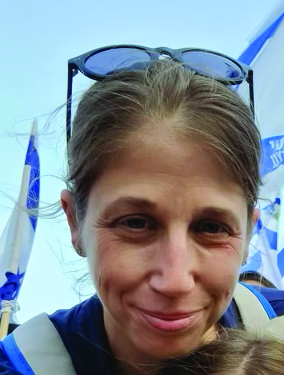Liz Dovrat
Where to start? How do you describe the terror, horror, and devastation of the last few days? It feels similar to how I processed the first shutdown of COVID-19, but with a knot of terror and sadness. My internal dialogue from the first day or two:
My initial reaction of the first messages of rockets in the south on Saturday morning: “ok, so I’ll just change to a short hike near our kibbutz instead of a longer one further away to appease my husband and mother-in-law.”
The slow dawning in the afternoon that something more serious happened in the south in the kibbutzim and small towns–“Ok, that sounds much too close to home (I live in a kibbutz on the Lebanon border), but why are my mother-in- law and sister-inlaw pressuring us to evacuate the north? They are closer to the rockets and sirens than we are.”
Sunday morning – receiving a phone call from our neighbor that we’re about to get an official message encouraging residents of our kibbutz to independently evacuate and then receiving it within 10 minutes. “Ok, I don’t believe I really need to do this, but homeland defense said so, so I’ll pack for six days (why six days – who knows) and I’ll take the passports just in case, but we’ll be back soon.”
Monday through now – coming to terms that this is a time of uncertainty – will Hezbollah open another front up north or just be satisfied throwing a few rockets? Will we invade Gaza to try to receive the hostages? Should we continue staying with my generous, loving mother-in-law in a small apartment meant for two with now five additional people at night plus another two or three people and two dogs during the day (my husband’s sister, her husband, toddler, and dogs) or find an AirBnB? Should we take advantage of our American passports and flee to the open arms of our family in the USA? How can I help my children handle another period of uncertainty, lack of structure with the extra layer of trying to understand war and why this happened? How do you explain to your children why someone hates us so much to kill in such an atrocious, inhumane way? How do you give them the information they need so they can make sense of the situation but not too much to scare them? How do help them feel safe and brave? How do you answer questions like “why is there war?” and “why can’t we just go and tell them (Hamas) that we want peace?”
Also – the details are starting to come – the massacres, atrocities, and destruction of whole families, communities, the kidnapping of children, mothers, senior citizens. The stories of incredible bravery, resilience to save others and survival. And finally – the heartbreaking funerals. I attended one today – the brother of a friend and a colleague, a commander in the army who died protecting his soldiers. On the way to the funeral, residents of the moshav stood on every corner – at least 1.5 miles – waving Israeli flags. Hundreds of people arrived to honor his memory and witness the impact he had on his community and his country. The tears of his family promising to stay together and support each other despite his absence. The loving words of his wife of only three months. Now take this scene and multiply it by 1,200. This is the weight of this tragedy on the Israeli people.
How do we move on from this? I have no idea – I don’t think anyone knows. All I know is that I need, at least for now, to focus hour by hour, day by day on helping my children process this event and gain the lessons I hope they will learn – the value of human life, the strength of the Jewish people, and the resilience they have within themselves to handle what this life throws at them. All I can do is write and speak about what has happened to the greater world in English so the world can see the inhumanity of Hamas.
Liz Dovrat is the daughter of Barbara Dudley, Jewish Community Relations Council chair. She occasionally writes for Jewish News on life in Israel with her family.

